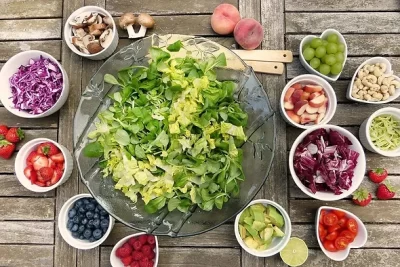Author: Mrs Geetanjali Borse, MSC PG Dip in Nutrition and Dietetics, Global Hospital and Research Institute, Pune
When your blood pressure rises to dangerous levels, you get a high blood pressure or hypertension. The calculation of your blood pressure takes into account how much blood flows into the blood vessels and how much resistance the blood faces as the heart pumps. Small arteries increase power. The higher the blood pressure is, the thinner the arteries become. Increased strain, like heart disease, may lead to health problems in the longer term.
A major population of the world today suffers from high blood pressure. It may even occur at a very young age a lot of cases have been recorded at the age of 28 to 30 years. The question arises, ‘What exactly leads to a high blood pressure’. Let’s look at the bakery products that have become a part of our daily diet. Bread, Khari, toast which is most often accompanied with tea. These food items contain maida (flour) and different kinds of fatty acids such as butter all of which are contributing factors to high triglycerides and cholesterol. Such products contain an excess amount of fibers and also have different types of antioxidants.
Antioxidants are the chemicals that help eliminate harmful chemicals, substances, or toxins from the body. Usually, Chinese food, ready to eat packets contains a high amount of preservatives that one again, contributes to the salt levels in the body. Sauces, fried foods, chicken, and high-fat milk and butter and lard are known to be responsible for high blood pressure or blockages in vessels.
Of course, it is better advised to be cautious about the intake of such foods as they tend to increase triglycerides and cholesterol in the body. Rather, include green leafy vegetables, freshly prepared salads, and fresh seasonal fruits. However, this only makes up for half of the portion of your plate for a meal. Exercise is vital for the body. It can even be in the form of Yoga. It solely depends on what is most suitable and appropriate for an individual concerning his health conditions. Meditation and breathing exercises promote a healthier, peaceful, and calm mind which in return equips us to lead a healthy life. If you are morbidly obese, a loss of weight and physical activity through a gut-healthy diet will help to lower your blood pressure.
Vegetable Salad will helps in controlling Blood Pressure

High Blood pressure has quite a few determinants but one of the most important and inevitable is Genes. It is often found that a condition of high or low blood pressure can run within the family tree. It is passed from generation to generation. For instance, you might be recommended that you have your blood pressure checked twice a year if your family has a history of heart disease or risk factors for the development of your condition. This helps you and your doctor to keep up with any issues until they become difficult.
Types of Hypertension
There are two types of Hypertension – Primary Hypertension and Secondary Hypertension.
Primary Hypertension is also known as essential hypertension. This form of hypertension evolves with no identifiable cause over time. Most people have a high blood pressure of this kind. Scientists still do not know what mechanisms gradually raise blood pressure. There may be a variety of factors. Genes, physical changes, environment are among them. If anything shifts in your body, you may start to have issues in your body. One such issue may be high blood pressure. For example, changes in the function of your kidney due to aging may alter the body’s natural salt and fluid balance. This shift will lead to a rise in your body’s blood pressure. Unhealthy lifestyle decisions, such as lack of exercise and poor diet, will over time affect your body. Choosing lifestyles can lead to issues with weight. Being obese or overweight will increase your risk of high blood pressure.
Secondary high blood pressure frequently takes place quickly and can be more extreme than primary high blood pressure. Various secondary hypertension disorders include kidney disease, obstructive sleep apnea, congenital heart defects, problems with your thyroid, and side effects of medications, use of illegal drugs, alcohol abuse or chronic use, adrenal gland problems, certain endocrine tumours.
Given the condition, women with hypertension can deliver healthy babies. But both mother and baby can be harmful if it is not closely supervised and handled during pregnancy. Complications are most common in women with high blood pressure. Pregnant women with high blood pressure, for example, can experience lower renal function. Babies born to hypertensive mothers may have or be born prematurely with low birth weight. During pregnancies, some women may experience high blood pressure. There can be various forms of hypertension issues. Often the condition switches around when the baby is born. Hypertension can improve your risk of hypertension during pregnancy later in life.
How to Control Hypertension
Changes in your lifestyle could help will your blood pressure if your doctor diagnoses you with primary hypertonia. You can visit any good hospital and get medication prescribed by the doctor if changes in your lifestyle are not necessary, alone, or if they cease to be successful. Given the treatment for the underlying cause, hypertension is often persistent. Your doctor will consult with you to make lifestyle improvements that can help relieve blood pressure and prescribe medications. Hypertension treatment plans also develop. What worked initially can over time become less useful. Your doctor will keep working with you to improve your health.
Blood pressure numbers of under 120/80 mm Hg are considered to be in the normal range. In this group, stick to aerobic safe habits such as a good diet and daily exercise. The high blood pressure is between 120-129 systolic and less than 80 mm diastolic Hg when levels are significantly different. High blood pressure is likely to improve if efforts are taken to control the condition. High blood pressure occurs. Step 1 is when the blood pressure is regularly between 130-139 Hg diastolic and systolic and 80-89 mm diastolic. Owing to the risk of atherosclerotic cardiovascular disease (ASCVD), such as heart attack or stroke, physicians are likely to recommend lifestyle modification at this level of elevated blood pressure. Hypertension Level 2 comes with a constant rate of blood pressure of 140/90 mm Hg or more. Doctors are typically recommending a mix of blood levels and improvements in behaviours at this level of elevated blood pressure.





























